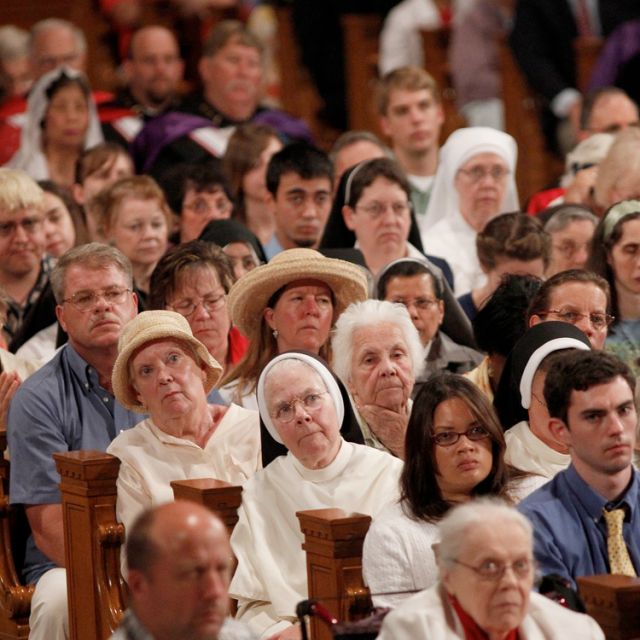While recent months have focused on the Obama administration’s mandate that Catholic institutions provide insurance for contraception, sterilization and abortion-inducing drugs, heightened concern about religious liberty dates back before Obama even took office. Indeed, it was in reaction to restrictions on services to illegal immigrants that the American bishops began to sound the alarm.
While the aggressive intrusion into the internal life of the Church by the Obama administration is unprecedented, attacks on religious liberty, both great and small, are broader, deeper and multiplying. The cultural winds are bringing a great chill all over the West, as the secular state seeks to exclude from both public policy and public life religious beliefs, religious believers and religious institutions. It is what Cardinal Marc Ouellet described as “secular fundamentalism” in the Canadian context.
The Fortnight for Freedom began with the feast of Sts. John Fisher and Thomas More, martyrs for the freedom of the Church under Henry VIII. The liturgical calendar then lifted up the heroic witness of Sts. John the Baptist, Peter and Paul, and the first martyrs of Rome. The Christian tradition has long witnessed Caesar treading upon things of God. The situation is not lethal in the United States or Canada — as it is abroad, where every month brings fresh news of Christian massacres — but the Christian disciple must be ever vigilant against Caesar’s ambitions.
“Today, July 4, we celebrate the birth of a novus ordo seclorum — a ‘new order of the ages,’ the American Era,” preached Archbishop Charles Chaput of Philadelphia at the closing Mass of the fortnight in Washington. “God has blessed our nation with resources, power, beauty and the rule of law. We have so much to be grateful for. But these are gifts. They can be misused. They can be lost. In coming years, we’ll face more and more serious challenges to religious liberty in our country. This is why the Fortnight for Freedom has been so very important.”
Though largely ignored by the mainstream media, the fortnight was a massive engagement by Catholics. The closing Mass, at the immense Basilica of the National Shrine of the Immaculate Conception on July 4, attracted an overflow congregation — some 3,000+ inside and another 1,500 on the steps outside.
Yet the fortnight included another moment, rather more quiet, but historically significant. Archbishop William Lori of Baltimore was in Rome to receive the pallium from Pope Benedict XVI. Chairman of the religious liberty committee, Archbishop Lori was invited by the Religious Liberty Observatory of the Italian foreign ministry to address them on threats to religious liberty in the United States. The Observatory is a new agency, created within the Italian foreign ministry, to enhance the attention given to religious liberty in Italian foreign policy.
As the first invited guest to address the Observatory, Archbishop Lori noted that it was unsettling that America had become an example of threats to the first freedom. Yet the recognition of that by the Italian Observatory is a sign that religious freedom is being eroded across the liberal democracies. Archbishop Lori quoted his predecessor in Baltimore, Cardinal James Gibbons, who defended the American arrangement in Rome in a famous address in 1886.
“Gibbons spoke these words,” Lori reminded his audience. “For myself, as a citizen of the United States, without closing my eyes to our defects as a nation, I proclaim with a deep sense of pride and gratitude, and in this great capital of Christendom, that I belong to a country where the civil government holds over us the aegis of its protection without interfering in the legitimate exercise of our sublime mission as ministers of the Gospel of Christ.”
Those defects are now more manifest, and Gibbons’ historic boast is less true in 2012 than in 1886.
America’s most cherished liberty under attack
By Fr. Raymond J. de SouzaOn the Fourth of July, the Catholic Church in the United States turned toward Washington, not for the fireworks, nor for a windy speech from the president, but for the conclusion of what the American bishops declared to be a Fortnight for Freedom.
I followed it rather more closely than most, since I was appointed last year a consultant to the American bishops Ad Hoc Committee for Religious Liberty. Alarmed at encroachments on religious liberty at home, and escalating violence against Christians abroad, the ad hoc committee of senior bishops proposed a special fortnight of prayer, fasting, catechesis and public action in defense of religious liberty. Summoning forth “all the energies the Catholic community can muster,” the fortnight was a dramatic appeal to Americans — both Catholic and otherwise — to realize that their “first, most cherished liberty” is under sustained and serious attack.
Please support The Catholic Register
Unlike many media companies, The Catholic Register has never charged readers for access to the news and information on our website. We want to keep our award-winning journalism as widely available as possible. But we need your help.
For more than 125 years, The Register has been a trusted source of faith-based journalism. By making even a small donation you help ensure our future as an important voice in the Catholic Church. If you support the mission of Catholic journalism, please donate today. Thank you.
DONATE
